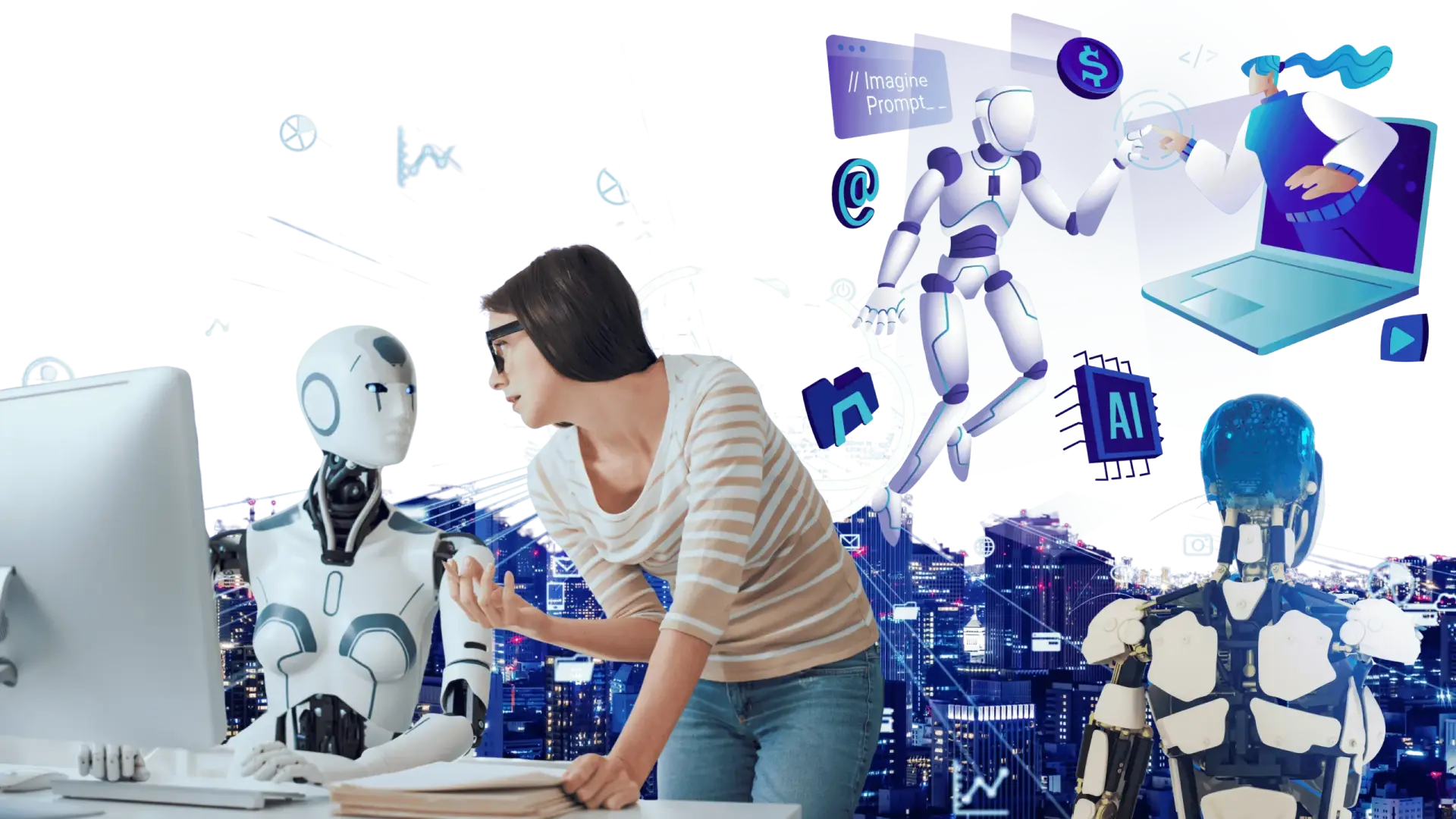The Impact of Character ai or AI on Web Development
Artificial Intelligence (AI) is dramatically changing the face of digital world, altering the way websites are built, maintained, and experienced. AI has proved to be a paradigm-shifting technology in the field of modern web development, from automating development workflows to creating hyper-personalized user journeys. It gives developers and designers the ability to improve performance, speed up project timetables, and improve usability. This in-depth blog post delves into the deep and rapidly growing impact of AI in web development, including use cases, tools, real-world applications and its future.

How AI is Revolutionizing Web Development in 2025
- a) Code Generation and Assistance
10X increase in the web development lifecycle with AI-powered tools. Using new tools such as GitHub Copilot, Amazon CodeWhisperer, Tabnine, and ChatGPT, developers can code more quickly and accurately and automate repetitive or mundane tasks to improve productivity.
Examples:
Contextual completion of complex functions
Turns plain English prompts into boilerplate code
Providing real-time debugging and documentation support
Use Case: A front end developer constructing a contact form in react can straight away tell an AI tool, create a responsive contact form with email validation, and in return, get a code block ready to deploy
- b) Automated Testing
Testing programs can be time-consuming, but with AI, the process is optimized; test cases can be generated and run by itself. It uses historical bug patterns to locate areas in the code that might be prone to errors.
Benefits:
Reduced human effort
Faster test coverage
Improved code reliability
AI-powered tools such as Testim and Functionize help keep test suites stable, even in the face of applications that are changing rapidly.
Artificial Intelligence in Web and User Experience (UX) Design
- a) Design Automation
AI-based website builders such as Wix ADI, Bookmark’s AIDA, and Zyro can build websites simply by asking users a few relevant questions. Tools like these help streamline the design process and empower non-developers to build professional agora.
- b) Customized User Interfaces
AI adjusts content layout, colors, and call-to-actions in real time to customers based on behavioral analytics and machine learning.
For instance, something like Netflix or YouTube recommends shows or videos based on interaction with videos already consumed, and modifies the interface continuously to enhance engagement
- c) AI-Driven A/B Testing
AI takes traditional A/B testing a step further by automatically pinpointing which design elements to test and dynamically tailoring variations to each user segment
AI in User Engagement:
- a) Conversational interfaces(Chatbots and Virtual Assistants):
AI chatbots have matured into intelligent support agents that can simulate human conversation. Abundant tools such as Drift, Intercom, Zendesk & ManyChat make 24/7 customer support available, collect data and generate dynamic answers.
Key Advantages:
Always available support
Qualification and conversion of leads
Reduced staffing costs
For example, a chatbot can lead users through a product demo, answer frequently asked questions, or schedule appointments while gathering user preferences.
- b) Voice Search Integration
Voice interfaces are changing the interaction how users interfacing with the voice. Natural Language Processing (NLP) is responsible for understanding spoken queries so that AI can align user intent with a response or web content.
For example, sites that are optimized for voice search become more discoverable in assistants like Google Home or Apple’s Siri.
AI in SEO and Content Optimization
- a) Creating & Improving Content
Jasper, Copy.ai, ChatGPT, Writesonic helps you create relevant and SEO-rich content at scale.
Functions:
Generating blog posts
Headlines and meta tags designed for SEO
Writing product descriptions
- b) Keyword and Trend Analysis
Content marketing Tools such as Surfer SEO, SEMrush, and MarketMuse use AI to find successful keywords, trending topics, and content gaps across spaces.
For instance, marketers analyse competitors using AI tools to discover undervalued long-tail keywords that can yield great conversions
- c) Data from the AI tracks visitor
Data from the AI tracks visitor behaviour and provides personalized experiences. Platforms such as Amazon and Spotify personalize content shown on their home page dynamically.
Impact: Enhanced user engagement, reduced bounce rates, and increased conversion rates.
AI in E-Commerce Platforms
- a. Personalized Product Suggestions
AI-powered recommendation engines suggest products most likely to be purchased by users based on their browsing, searching, and purchasing histories.
For instance, collaborative filtering and machine learning algorithms are behind “People also bought” or “You may like” sections on e-commerce sites.
- b) On Inventory Forecasting and Dynamic Pricing
AI can dynamically adjust pricing and predict inventory by analyzing demand, competition and customer behavior in real-time.
Benefits:
Maximized profit margins
Less stockouts or overstock
- c) Fraud Detection
AI tools analyze and recognize behavior patterns to identify and prevent suspicious transactions. Anomalies, such as speedy checkouts or mismatched billing information, are identified by machine learning models.
Result: More security, less money lost
AI in Cybersecurity
- a) Identify and Prevent Threats
Real-time web traffic monitoring: AI tracks and analyses real-time web traffic — identifying malicious activity such as SQL injections, cross-site scripting, or brute-force attacks.
Example Tools: Darktrace, and Cloudflare AI REBLaze
- b) Anomaly Detection
AI can identify deviations from normal user behaviour patterns, which could signify a compromised account or system, by learning these patterns over time.
- c) Spam and Bot Filtering
Even more, AI-based technologies can identify and mitigate malicious bots or spam posts prior to hurting website performance and user trust.
AI in Web Analytics
Turning web analytics from static reports to interactive insights with AI It outlines activity analytics, forecasts future behaviours, and suggests optimizing.
Top Features:
- Funnel optimization
- Predictive segmentation
- Customer churn prediction
Popular Tools:
- Google Analytics 4 (GA4)
- Mixpanel
- Heap Analytics
For instance, AI in GA4 surfaces insights like “Users from mobile have a higher bounce rate”, helping you take action to improve your site.
The Future of AI in Web Development and Emerging Technologies
- a) Web 4.0 - The Intelligent Internet
The new internet will be AI-driven, context-aware and hyper-personalized. Web 4.0 will analyse data when needed, to meet user needs, using AI and IoT convergence
- b)AI + Augmented Reality
AI-infused AR allows for more personalized experiences such as virtual try-ons in industries like fashion make it possible to try before you wear, increasing purchase confidence and reducing returns
Advantages of AI in Web Development
For example, here are the differences between WordPress and Wix in terms of feature key benefits:
Feature | Key Benefit
Code Automation | Faster development, fewer bugs
Personalization | Customized user experiences
Smart Analytics | Data-backed marketing and UX improvements
24/7 Support | Better engagement with intelligent chatbots
SEO Enhancement | Improved discoverability and ranking
Enhanced Security | Proactive threat monitoring and prevention
Recommended AI Tools by Category :
These are the tools you may find useful for each category:
|Category | Tools |
|——————|—————————————————-|
| Development | GitHub Copilot, CodeWhisperer, Tabnine |
| Chatbots | Drift, Intercom, ManyChat, ChatBot.com |
| SEO | Surfer SEO, SEMrush, Clearscope |
| Content | Jasper, Writesonic, ChatGPT, Copy.ai |
| Analytics | GA4, Mixpanel, Heap |
| E-Commerce | Shopify Magic, Algolia Recommend, Clerk.io |
| Design | Wix ADI, Zyro, Bookmark AIDA |
| Security | Cloudflare AI, Darktrace, Reblaze |
- Final Thoughts: Why AI Is the Future of Web Development
AI isn’t merely impacting web development; it’s revolutionizing it. AI is becoming pivotal from automating tasks that consume a lot of time to serving real-time personalization to users. By incorporating AI at every level of the web: from design and development to security and analytics, businesses can create smarter, faster, and more resilient digital platforms.
For both companies and developers, the present is the time to leverage AI not just as a tool but a co-strategist in a digital transformation process. With the right AI-powered tools deployed, you can stay one step ahead of the game, provide meaningful engagement, and help craft an intelligent digital experience.



